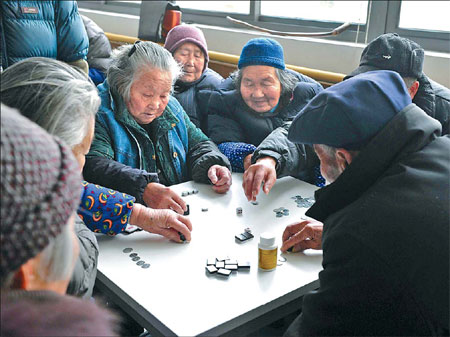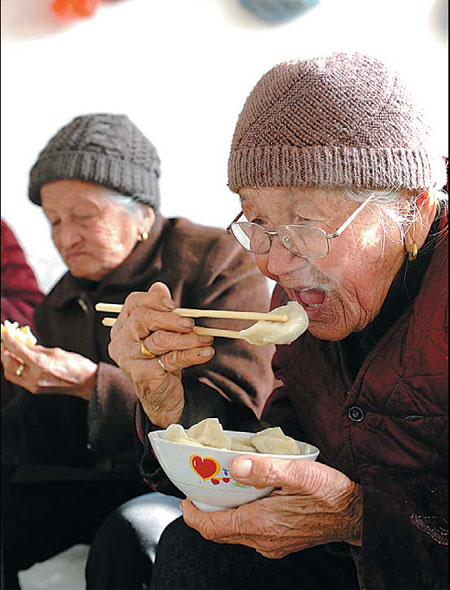 |
|
|
|
|||||||||
|
 |
|
Senior citizens play mahjong at an old people's home in Anting town in Shanghai's Jiading district. China has seen a growing number of elderly people since 1999. Some cities plan "homes-for-pensions" projects to supplement low pensions. [Photo/China Daily] |
'Reverse mortgage' income stream yet to gain popular acceptance, reports Wu Yiyao in Shanghai.
The old adage of "raising children as a pension for old age" has acquired a hollow ring in our fast-moving times. The tradition of the old agricultural society is fading fast. For many elderly couples, the apartments they own are a much more assured guarantee of funds in their twilight years.
Meanwhile, instead of fulfilling their filial duties, many young people, especially those in larger cities, are living off their parents' savings. It has almost become customary in recent years for a son to expect his parents to provide the down payment on an apartment as a wedding gift.
The problems of the rapidly-aging Chinese population are compounded by the fact that many elderly people are covered by limited pensions in cities and some have no cover at all. The insurance industry on the mainland was in its infancy when today's elderly people were of working age.
Other than their savings, the only financial backup a typical elderly couple has is usually the apartment in which they live. But escalating property prices nationwide have offered these elderly homeowners the option of generating a steady income through, in banking parlance, a "reverse mortgage".
Popular in many developed economies, reverse mortgages allow property owners to use their homes as collateral to secure a bank loan which is released in a set monthly amount over a fixed term, which can run for many years.
In recent months, reverse mortgages for senior citizens have drawn wide attention across the country. Beijing municipality and Liaoning province in Northeast China have said they will pioneer "homes-for-pensions" plans in the coming five years. Other cities and regions are expected to follow soon.
China Citic Bank, the first lender to introduce a homes-for-pensions plan in China, recently launched a service for home owners aged 55 or older, as well as their offspring, who want to find a source of funding by putting their homes on a reverse mortgage.
The facilities for this sort of mortgage are presently kept below 60 percent of the market value of each property. The borrower can opt to receive a monthly payment, with a maximum of 20,000 yuan ($3,170), over a period of no longer than 10 years, according to the bank.
Reverse mortgages have yet to become popular in China, and it will take a long time before people recognize and accept them, according to China Citic Bank. However, economists and sociologists believe the homes-for-pensions plan will catch on quickly as the elderly become more aware of it.
As the first generation of China's family planning policy, introduced in the 1970s, many young couples have to cope with an added burden. Each member is an only child, but the couple has to support two sets of elderly parents and sometimes even grandparents as well.
"My parents don't feel the pressure of taking care of the elderly because their siblings are sharing the responsibility of looking after my grandparents. But my husband and I have to support four elderly people, ourselves, and our son - that's seven people in total," said Chen Yanjun, a 31-year-old accountant from Shanghai.
Since 1999, China has witnessed a growing number of elderly people. The country has 176 million people aged 60 or older, roughly 13.3 percent of the population. The Ministry of Civil Affairs has predicted that the number will rise to 243 million in 2020, accounting for 18 percent of the population.
|
 |
|
Pensioners eating dumplings at an old people's home in Liaocheng, Shandong province. Students at the city's Liaocheng University often volunteer to help the elderly by offering to chat, clean rooms and make dumplings. [Photo/for China Daily] |
China has more than 40,000 care homes for the elderly, with 3.15 million placements for senior citizens by the end of 2010, those resources are not enough to cater for the huge demand, according to the Plan for the Social Service System for the Aged (2011-2015), released by the general office of the State Council.
The authorities also provide varying levels of financial support for senior citizens, based on their location. But some elderly people have complained that there is a wide disparity between what they are given and what they need.
"We receive stipends of around 400 yuan each month. It's a small amount, and it's better than no stipend at all. However, we need to seek financial support from our kids because our pensions are simply not enough," said Liu Yulin, a 72-year-old Shanghai resident.
In China, many senior citizens have limited access to pensions and social security, but most own property, providing a potentially huge market for reverse mortgages, according to Meng Xiaosu, a visiting professor in enterprise management at Peking University.
In a pamphlet on reverse mortgages, written by Meng and Chai Xiaowu, a professor at Zhejiang University who advocates homes-for-pensions, the authors list a number of risks that homes-for-pensions financial services may encounter.
Like other financial services, reverse mortgages are subject to fluctuating interest rates and property values, deflation and inflation. Financial institutions and borrowers are both likely to shoulder a considerable loss if the fluctuations are too big.
The risk of moral hazard, including intentional default, must also be taken into consideration, according to Meng and Chai. The expropriation of land and the demolition of housing, leading to relocation of the residents, simply add to those risks.
However, the greatest difficulty comes from the pressure of the Chinese tradition that the homes of the elderly should be inherited by the children, who will take care of their parents in return.
"Children of the elderly persuade their parents not to consider reverse mortgages, because they want to inherit the property," said Zhang Wan, a wealth manager at a branch of China Citic Bank in Shanghai.
More than 40 elderly people have consulted Zhang about the reverse mortgage service, but, as of March 30, no agreements had been signed.
"In the end, the elderly people tell me that their children disagree with putting the property on a reverse mortgage. One old couple said they had no offspring, but their niece would like to inherit the house and had promised to take care of them," said Zhang.
Despite her complaints about the pressures of taking care of her parents and parents-in-law, Chen, the Shanghai accountant, said she would be unhappy if they considered a reverse mortgage. "If they joined the homes-for-pensions plan, people would talk. Neighbors and friends would say that we are not willing to take responsibility for them, and so they've been forced to resort to the banks instead, thereby seeking help from a group of strangers rather than their own kids."
Contact the reporter at wuyiyao@chinadaily.com.cn